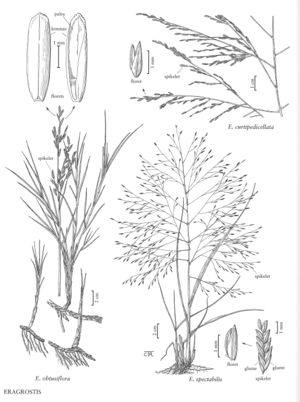Difference between revisions of "Eragrostis spectabilis"
FNA>Volume Importer |
imported>Volume Importer |
||
| Line 20: | Line 20: | ||
-->{{Treatment/Body | -->{{Treatment/Body | ||
| − | |distribution=Conn.;N.J.;N.Y.;W.Va.;Del.;D.C;Wis.;Iowa;Mass.;Maine;N.H.;R.I.;Vt.;Fla.;Wyo.;N.Mex.;Tex.;La.;Tenn.;N.C.;S.C.;Pa.;Va.;Colo.;Ala.;Kans.;N.Dak.;Nebr.;Okla.;S.Dak.;Ark.;Ill.;Ga.;Ind.;Man.;Ont.;Que.;Ariz.;Md.;Ohio;Mo.;Minn.;Mich.;Miss.;Ky. | + | |distribution=Conn.;N.J.;N.Y.;W.Va.;Del.;D.C.;Wis.;Iowa;Mass.;Maine;N.H.;R.I.;Vt.;Fla.;Wyo.;N.Mex.;Tex.;La.;Tenn.;N.C.;S.C.;Pa.;Va.;Colo.;Ala.;Kans.;N.Dak.;Nebr.;Okla.;S.Dak.;Ark.;Ill.;Ga.;Ind.;Man.;Ont.;Que.;Ariz.;Md.;Ohio;Mo.;Minn.;Mich.;Miss.;Ky. |
|discussion=<p><i>Eragrostis spectabilis</i> is native in the eastern portion of the Flora region, extending from southern Canada through the United States, Mexico, and Central America to Belize. It grows in fields and on the margins of woods, along roadsides, and in other disturbed sites, usually in sandy to clay loam soils, at 0-1830 m, and is associated with hardwood forests, Prosopsis-Acacia grasslands, and shortgrass prairies. A showy species, <i>E. spectabilis</i> is available commercially for planting as an ornamental.</p> | |discussion=<p><i>Eragrostis spectabilis</i> is native in the eastern portion of the Flora region, extending from southern Canada through the United States, Mexico, and Central America to Belize. It grows in fields and on the margins of woods, along roadsides, and in other disturbed sites, usually in sandy to clay loam soils, at 0-1830 m, and is associated with hardwood forests, Prosopsis-Acacia grasslands, and shortgrass prairies. A showy species, <i>E. spectabilis</i> is available commercially for planting as an ornamental.</p> | ||
|tables= | |tables= | ||
| Line 38: | Line 38: | ||
|illustrator=Linda A. Vorobik;Cindy Roché | |illustrator=Linda A. Vorobik;Cindy Roché | ||
|illustration copyright=Utah State University | |illustration copyright=Utah State University | ||
| − | |distribution=Conn.;N.J.;N.Y.;W.Va.;Del.;D.C;Wis.;Iowa;Mass.;Maine;N.H.;R.I.;Vt.;Fla.;Wyo.;N.Mex.;Tex.;La.;Tenn.;N.C.;S.C.;Pa.;Va.;Colo.;Ala.;Kans.;N.Dak.;Nebr.;Okla.;S.Dak.;Ark.;Ill.;Ga.;Ind.;Man.;Ont.;Que.;Ariz.;Md.;Ohio;Mo.;Minn.;Mich.;Miss.;Ky. | + | |distribution=Conn.;N.J.;N.Y.;W.Va.;Del.;D.C.;Wis.;Iowa;Mass.;Maine;N.H.;R.I.;Vt.;Fla.;Wyo.;N.Mex.;Tex.;La.;Tenn.;N.C.;S.C.;Pa.;Va.;Colo.;Ala.;Kans.;N.Dak.;Nebr.;Okla.;S.Dak.;Ark.;Ill.;Ga.;Ind.;Man.;Ont.;Que.;Ariz.;Md.;Ohio;Mo.;Minn.;Mich.;Miss.;Ky. |
|reference=None | |reference=None | ||
|publication title= | |publication title= | ||
|publication year= | |publication year= | ||
|special status= | |special status= | ||
| − | |source xml=https:// | + | |source xml=https://bibilujan@bitbucket.org/aafc-mbb/fna-data-curation.git/src/bb6b7e3a7de7d3b7888a1ad48c7fd8f5c722d8d6/coarse_grained_fna_xml/V25/V25_144.xml |
|subfamily=Poaceae subfam. Chloridoideae | |subfamily=Poaceae subfam. Chloridoideae | ||
|tribe=Poaceae tribe Cynodonteae | |tribe=Poaceae tribe Cynodonteae | ||
Revision as of 23:01, 27 May 2020
Plants perennial; cespitose, with innovations and short, knotty rhizomes less than 4 mm thick. Culms 30-70(85) cm, erect, glabrous. Sheaths hairy on the margins and at the apices, hairs to 7 mm; ligules 0.1-0.2 mm; blades 10-32 cm long, 3-8 mm wide, flat to involute, both surfaces usually pilose, sometimes glabrous on both surfaces or glabrous abaxially and sparsely pilose adaxially, often with a line of hairs behind the ligules, hairs to 8 mm. Panicles (15)25-45(60) cm long, 15-35 cm wide, broadly ovate to oblong, open, basal portions sometimes included in the uppermost leaf sheaths; primary branches (6)12-20 cm long, diverging 20-90° from the rachises, capillary, naked below; pulvini hairy, hairs to 6 mm; pedicels 1.5-17 mm, divergent or appressed. Spikelets 3-7.5 mm long, 1-2 mm wide, linear-lanceolate, reddish-purple, sometimes olivaceous, with (4)6-12 florets; disarticulation basipetal, glumes persistent. Glumes subequal to equal, (1)1.3-2.3 mm, lanceolate, membranous to chartaceous; lemmas (1)1.3-2.5 mm, ovate to lanceolate, leathery, 3-veined, apices acute; paleas (1)1.2-2.4 mm, membranous, keels sometimes shortly ciliate, apices obtuse to truncate; anthers 3, 0.3-0.5 mm, purplish. Caryopses 0.6-0.8 mm, ellipsoid, strongly flattened, adaxial surfaces with 2 prominent ridges separated by a groove, reddish-brown. 2n = 20, 40, 42.
Distribution
Conn., N.J., N.Y., W.Va., Del., D.C., Wis., Iowa, Mass., Maine, N.H., R.I., Vt., Fla., Wyo., N.Mex., Tex., La., Tenn., N.C., S.C., Pa., Va., Colo., Ala., Kans., N.Dak., Nebr., Okla., S.Dak., Ark., Ill., Ga., Ind., Man., Ont., Que., Ariz., Md., Ohio, Mo., Minn., Mich., Miss., Ky.
Discussion
Eragrostis spectabilis is native in the eastern portion of the Flora region, extending from southern Canada through the United States, Mexico, and Central America to Belize. It grows in fields and on the margins of woods, along roadsides, and in other disturbed sites, usually in sandy to clay loam soils, at 0-1830 m, and is associated with hardwood forests, Prosopsis-Acacia grasslands, and shortgrass prairies. A showy species, E. spectabilis is available commercially for planting as an ornamental.
Selected References
None.
